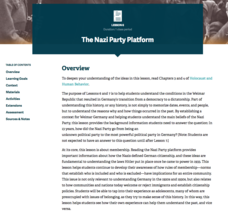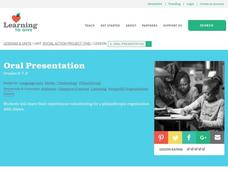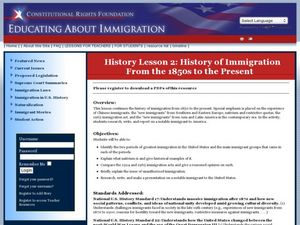Curated OER
Political Cartoons
Students examine a variety of historical cartoons. They recognize a political cartoon and identify the main idea, symbolism, exaggeration and caricature in political cartoons. Students analyze a political cartoon by Benjamin Franklin.
Curated OER
Alexander Hamilton and the Roots of Federalism
Explore the origin of political parties in the United States. Learners work in groups to read and analyze copies of the "Report on Manufactures" written by Alexander Hamilton. Then, they complete a worksheet comparing the Federalists to...
Curated OER
Political Movement: Political Parties
Students explore politics by researching Australian government law. In this political parties lesson, students define the different active parties in Australia and their roles within the country. Students complete a word bank activity...
Museum of the American Revolution
Image Analysis: In Their Own Words
Images often convey more than words. Scholars examine political cartoons from the American Revolution to understand how images have the ability to express political ideas. Academics participate in group discussion, complete a worksheet,...
Stanford University
Explosion of the Maine
An intriguing lesson features newspaper articles to help academics understand the political impact of the sinking the Maine and how the American media depicted the event. Scholars also view a presentation, participate in group...
Curated OER
An Upbeat West Side Story: Puerto Ricans and Postwar Racial Politics in Chicago
Tenth graders read an article about the migration of Puerto Ricans to Chicago. As a class, they identify the barriers the immigrants faced regarding employment and separation from family members. To end the lesson plan, they work with...
Facing History and Ourselves
The Nazi Party Platform
Not all party platforms stay democratic. A resource covers many political issues in Germany during the time of World War II, and teaches pupils about the Nazi party platform and what went wrong. Individuals participate in a warm-up...
National Endowment for the Humanities
Life Before the Civil War
American life before the Civil War was very different from American life today. To show this difference in a full spectrum, learners compare two communities that illustrate the differences between Northern and Southern life. Throughout...
iCivics
Step One: We've Got Issues
What is the most pressing issue in your community? The resource helps you and your middle schoolers begin the process of doing something about it! Learners compare and contrast two pressing issues in their local counties by reading two...
West Virginia Department of Education
Editorials: The Guiding Voice of Authority?
How much can opinion influence a news story? A standalone resource discusses the importance of John Brown's Raid through the lens of journalism. Learners analyze two different texts, one from the perspective of the North and the other of...
Curated OER
Arkansas' Top Ten Events of the Century....Says Who? Why? Deciding What is Important in History
Middle and high schoolers work in small groups to compare four different lists published in the Arkansas Times newspaper which chose the "top ten" Arkansas news events of the 20th century. Learners look for similarities and differences...
Curated OER
Election of 1864
An interesting lesson plan uses a hands-on-activity and group discussion to explore the 1864 presidential election and Lincoln's plans for ending the Civil War. Designed for high school, the resource also requires historians to...
Curated OER
Central American Immigrants to the United States: Refugees from Unrest
Students identify the major aspects of Olmec and Mayan civilzations, including economic, political, and religious. They list contributions of these civilizations. Students identify the Central American countries where the United States...
Curated OER
Oral Presentation
Practice public speaking in this oral presentation lesson plan. Middle schoolers list the characteristics of a powerful speaker. They watch a video of two speakers, compare them and discuss the qualities of a good speech. Afterwards,...
Curated OER
Lights, Camera, Action! The Role of SCRUM in Parliament
Learners explore the purpose of SCRUM in Canadian government, and the roles played by both politicians and the media during SCRUM. They assume roles as politicians and media personnel and stage a SCRUM of their own.
West Virginia Department of Education
Intelligence of Authentic Character - News Coverage and John Brown's Raid
The resource, a standalone, shows how news coverage of John Brown's Raid began when the event happened and how that reporting shaped perception in West Virginia history. The resource includes interesting anticipatory discussion...
University of Pennsylvania
Mock Trial of Alfred Dreyfus
What if scholars based mock trials on history? The fourth installment of a five-part series on the Dreyfus Affair asks learners to read various pieces of evidence before conducting a mock trial for a French officer. Teams answer...
University of Pennsylvania
Decoding Propaganda: J’Accuse…! vs. J’Accuse…!
Reading snail mail is a great way to go back into history and to understand others' points of view. The resource, the second in a five-part unit, covers the Dreyfus Affair. Scholars, working in two different groups, read one letter and...
Curated OER
Comparing Primary Sources from the Industrial Revolution
Tenth graders, in teams, analyze, evaluate and describe primary sources pertaining to industrialization at the turn of the century. They examine the sources and answer questions about each.
Curated OER
ESOL Interpersonal Communication
Students examine vocabulary words pertaining to the physical and personal characteristics of self, family, and others. They pronounce the vocabulary words and determine comparative adjectives for the words that are polite. They write...
Curated OER
Ft. Vancouver Fur Trade: a Skin for a Skin
Young scholars examine political presence of Hudson's Bay Company, explore economic impact of European demand for beaver pelts and the fur trapping trade, and practice counting in Chinook Jargon.
Curated OER
Me Oh Maya
Students compare basketball to Mayan ring-ball. They write a newspaper article that may have been published during Mayan times.
Curated OER
Today and Yesterday: The Praties They are Small
Students explore the tragic circumstances of the Great Famine of 1845-1849. They watch a program that explores the causes and consequences of the famine. Students discuss the causes of the famine. They identify the effects and...
Curated OER
History of Immigration From the 1850's to the Present
Eleventh graders study the history of immigration from 1850 to the present. In this American History lesson, 11th graders compare the 1924 and 1965 immigration acts and give a reasoned opinion on each. Students research, write, and...

























